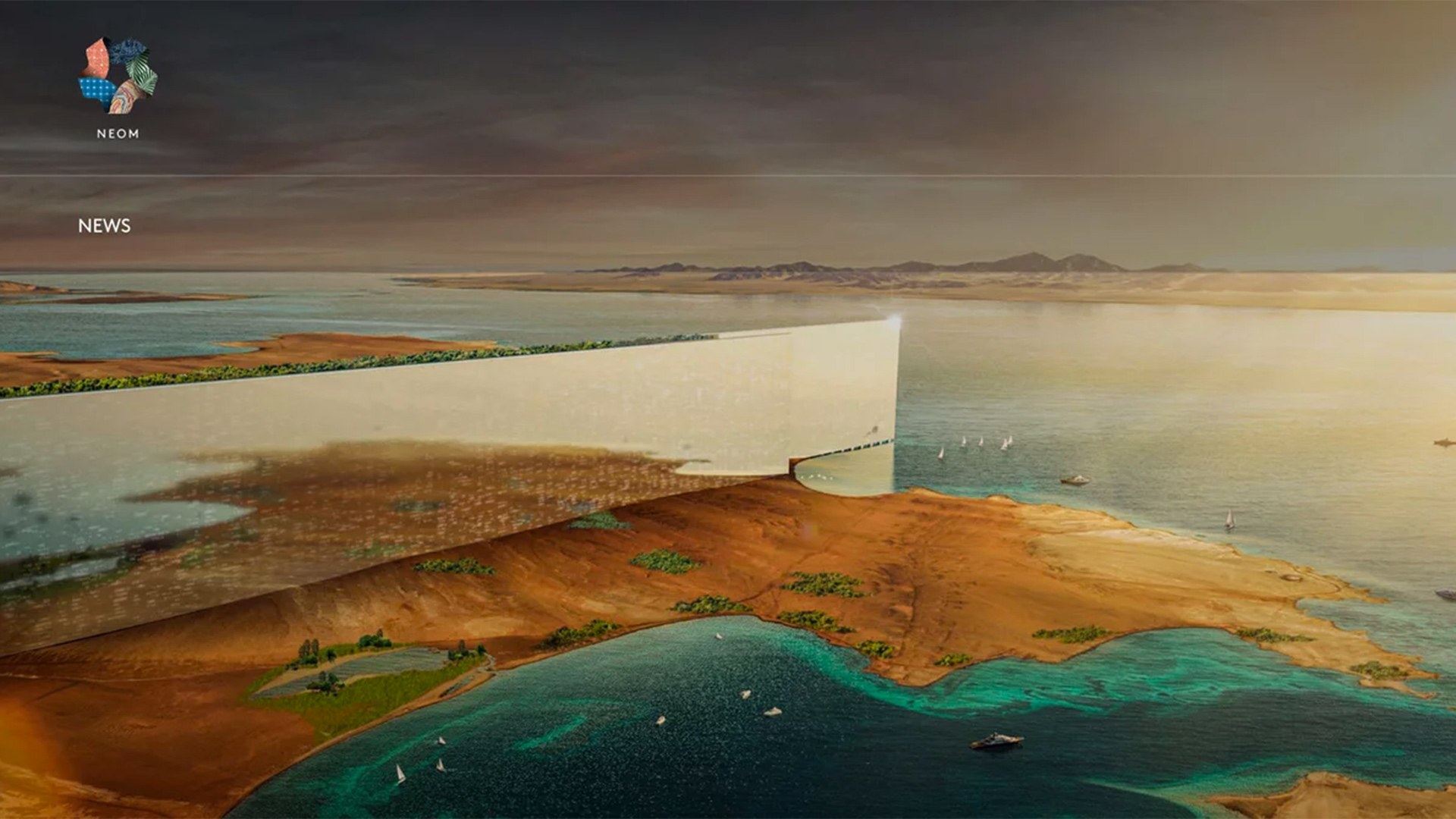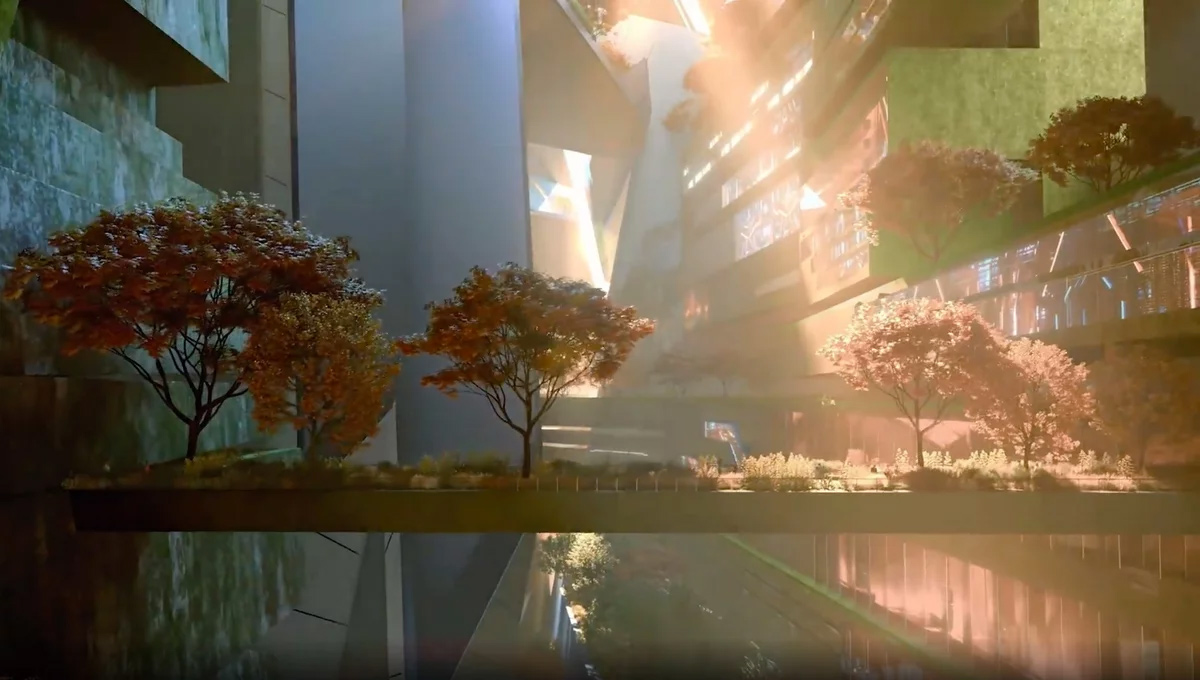 VIEW LARGER The Line is an ambitious part of Saudi Crown Prince Mohammed bin Salman's plan to diversify the kingdom's economy and remake part of its geography.
VIEW LARGER The Line is an ambitious part of Saudi Crown Prince Mohammed bin Salman's plan to diversify the kingdom's economy and remake part of its geography. A tall and narrow stripe of a city more than 105 miles long, teeming with 9 million residents and running entirely on renewable energy — that's the vision Saudi Arabia's leaders have for The Line, part of a "giga-project" that will reshape the kingdom's northwest.
Newly revealed design concepts show a futuristic walled city — its open interior is enclosed on both sides by a mirrored façade — stretching from the Red Sea eastward across the desert and into a mountain range.
Details emerge about the monolithic city
New stats and designs revealed on Monday include:
- It will be only 200 meters wide (roughly 220 yards);
- It will rise 500 meters above sea level — higher than the Empire State Building;
- Residents will be able to run errands with a five-minute walk;
- There will be no cars or roads;
- High-speed rail will carry people from end to end in 20 minutes;
- It will cost hundreds of billions of dollars to build.
Construction has already begun, and Saudi projections call for 1.5 million people to live in The Line by 2030. The unconventional megacity is part of the government's ambitious Neom development project, which released conceptual videos showing the city's high walls enclosing trees, gardens and other plant life, nestling communities among work and recreational structures.
"The designs revealed today for the city's vertically layered communities will challenge the traditional flat, horizontal cities and create a model for nature preservation and enhanced human livability," Saudi Crown Prince Mohammed bin Salman said on Monday, as he unveiled the new designs.
The designers say the structure will maintain an ideal climate year-round, thanks to its mix of shade, sunlight and ventilation. But not everyone was as keen on the concept of living between gigantic walls in the Saudi desert.
"I never seen something more dystopian," one commenter wrote in reply to a video of The Line posted by the Saudi Press Agency.
 VIEW LARGER Saudi projections call for 1.5 million people to live in The Line by 2030. The unconventional megacity is part of the Neom project, which released conceptual videos showing the city's high walls enclosing trees, gardens and other plant life, nestling communities among work and recreational structures.
VIEW LARGER Saudi projections call for 1.5 million people to live in The Line by 2030. The unconventional megacity is part of the Neom project, which released conceptual videos showing the city's high walls enclosing trees, gardens and other plant life, nestling communities among work and recreational structures. It's like wanting to live on Mars, an expert says
The idea of solving urban problems by creating a city from scratch isn't new. It's been tried before, from Brasília and India's Chandigarh to Malaysia's Putrajaya and Masdar City in Abu Dhabi, as Carlos Felipe Pardo, a senior adviser to the New Urban Mobility Alliance, notes.
"This solution is a little bit like wanting to live on Mars because things on Earth are very messy," Pardo, who's based in Colombia, tells NPR via email.
Despite starting with a clean slate, such elaborate urban plans have generally "created new urban settings where problems have also arisen," Pardo says.
While he grants that the approach can take on some typical city challenges head-on, Pardo says that it doesn't help people already living with problems elsewhere.
Looking at designs for The Line, Pardo worries that its high-tech approach seems to ignore people's desire to simply go outside, to experience something in a city that isn't man-made.
"This seems impossible, greatly limited or just plain artificial," he says.
Still, Pardo adds, "I'm sure several characteristics of this design could be integrated into existing cities, and it would be great to have a way of doing so."
Questions arise about the futuristic city
While the project's supporters tout The Line's zero emissions and a smaller footprint than conventional cities, critics note that those utopian ideals will come at an environmental price, as an entirely new city is created in the desert.
Neom is led by bin Salman, who aims to diversify the kingdom's economy and help it respond to climate change. The project is bankrolled by the government's public investment fund.
Questions persist about how tightly Western countries should embrace Saudi Arabia and bin Salman, whom the U.S. says approved a 2018 operation in Istanbul, Turkey, that ended with the gruesome killing of journalist Jamal Khashoggi by Saudi agents.
Saudi Arabia also has been waging a bloody proxy war against Iran in Yemen, and it's done little to address its record of human rights abuses.
In an apparent effort to ease potential residents' concerns about living under the kingdom's restrictive laws, a Neom tourism official recently said that residents would be called "Neomians" and would be subject to different rules, according to the Saudi Gazette.
That comment got wide attention, and Neom then "strongly denied" the idea, saying that while the area would be a special economic zone, it would still be part of the kingdom and "subject to all rules ... related to security, defense and border protection."

By submitting your comments, you hereby give AZPM the right to post your comments and potentially use them in any other form of media operated by this institution.